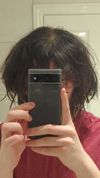community Question for those people applying topical pyril (or ru) and another topical like min (or min/fin), what's your regimen?
The conversation is about the difficulty of applying both pyril and min/fin to treat hair loss twice daily and whether combining them yields positive results.
